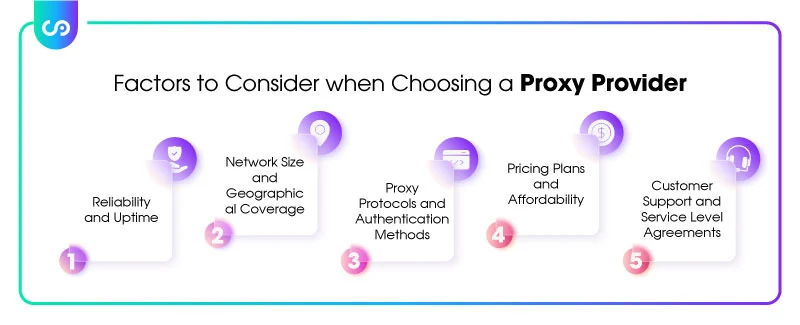In today’s digital landscape, choosing the best proxy provider has become crucial for individuals and businesses alike. The right proxy provider can make a significant difference in terms of reliability, security, and performance. This comprehensive guide aims to shed light on the key factors to consider when choosing a proxy provider and provide you with the necessary insights to make an informed decision.

Throughout this guide, we will explore various aspects such as proxy types, features, pricing, and support to help you understand the importance of selecting the best proxy provider. By the end of this guide, you will be equipped with the knowledge and tools to make a confident choice that aligns with your specific needs and requirements. Let’s dive in and explore the world of proxy providers together.
Understanding Proxy Providers
Proxy providers play a crucial role in facilitating secure and reliable internet connectivity for individuals and businesses. These providers act as intermediaries between users and the internet, allowing users to access online content while maintaining their privacy and anonymity. Proxy providers offer a range of proxy types, each with its own unique characteristics and advantages. Common types include residential proxies, datacenter proxies, and mobile proxies.
Related article: What is Residential Proxy?
By partnering with a reliable proxy provider, users can enjoy numerous benefits. First and foremost, proxy providers offer a wide pool of IP addresses, enabling users to mask their true identities and bypass geographical restrictions. This is particularly beneficial for accessing region-specific content or engaging in market research. Additionally, a reputable proxy provider ensures high-speed and reliable connections, minimizing latency and downtime.

Furthermore, using a reliable proxy provider enhances online security by adding an extra layer of protection between users and the internet. Proxy providers often employ advanced security measures, such as encryption and authentication protocols, to safeguard user data and prevent unauthorized access.
Choosing the right proxy provider is crucial to ensure a seamless and secure online experience. Factors to consider include the provider’s reputation, customer support, pricing plans, and scalability. By selecting a reliable and reputable proxy provider, users can unlock the full potential of proxies and enjoy enhanced privacy, security, and connectivity.
Factors to Consider when Choosing a Proxy Provider
When selecting a proxy provider, several key factors should be taken into consideration to ensure the best fit for your needs. These factors play a crucial role in determining the reliability, performance, and overall quality of the proxy service. Here are some important considerations:
- Reliability and Uptime: One of the primary factors to assess is the provider’s track record of reliability and uptime. Look for providers that offer high uptime guarantees, ensuring that your proxy connections remain stable and uninterrupted.
- Network Size and Geographical Coverage: The size and diversity of the provider’s proxy network are important factors. A larger network with diverse IP addresses across various locations allows for better flexibility and enables accessing geo-restricted content from different regions.

- Proxy Protocols and Authentication Methods: Evaluate the available proxy protocols and authentication methods supported by the provider. Common protocols include HTTP, HTTPS, SOCKS, and more. Ensure that the provider offers the protocols and authentication methods that align with your specific requirements.
- Pricing Plans and Affordability: Consider the pricing plans offered by the provider and assess their affordability based on your budget. Look for transparent pricing structures that provide value for money and offer flexible plans to accommodate your usage needs.
- Customer Support and Service Level Agreements: A reliable proxy provider should offer prompt and efficient customer support to address any issues or queries. Look for providers that offer 24/7 support and robust service level agreements (SLAs) to ensure you receive the assistance you need when facing any technical or operational challenges.
Related article: The Best Residential Proxy Providers in 2023
By carefully evaluating these factors, you can choose a proxy provider that meets your specific requirements in terms of reliability, network coverage, security, pricing, and customer support. Taking the time to select the right proxy provider will ensure a seamless and efficient proxy experience, supporting your online activities and objectives.
Conclusion
In conclusion, choosing the right proxy provider is a critical decision that can significantly impact your online activities and objectives. Throughout this guide, we have explored the essential factors to consider when selecting a proxy provider. We have discussed the importance of reliability and uptime, the significance of network size and geographical coverage, the role of proxy protocols and authentication methods, the value of transparent pricing plans, and the need for excellent customer support and service level agreements.
By carefully considering these factors and making an informed decision, you can ensure a seamless and reliable proxy experience that aligns with your specific needs. Remember, a reliable proxy provider is more than just a service; it becomes an essential partner in enabling secure and efficient internet connections. So take the time to assess your requirements, evaluate the options available, and choose a proxy provider that meets your expectations.
We hope that this guide has provided you with valuable insights and recommendations to guide you in selecting the best proxy provider for your needs. Make use of the knowledge gained here to make an informed decision that will support your online activities and contribute to your success.
FAQs
What should I consider when evaluating proxy provider reliability?
When evaluating proxy provider reliability, consider factors such as server uptime, connection stability, and historical performance data.
How does the size of the proxy network affect performance?
The size of the proxy network can affect performance by providing a larger pool of IP addresses, reducing the risk of IP blocking and improving overall availability.
Which proxy protocols are commonly used and why?
Commonly used proxy protocols include HTTP, HTTPS, SOCKS4, and SOCKS5. Each protocol offers different levels of security and compatibility with various applications.
What pricing models do proxy providers offer?
Proxy providers offer various pricing models, including per-proxy pricing, bandwidth-based pricing, and subscription-based pricing. It’s important to choose a pricing model that aligns with your usage requirements and budget.






